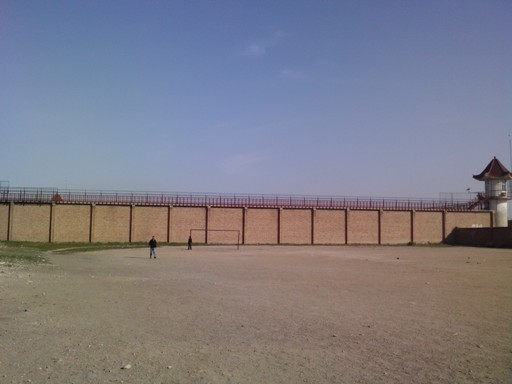 |
|
|
Bogot Municipality Gu Cheng Wan Detention Center
|
Five of eleven ethnic Mongolians along with one Chinese were arrested on August 12, 2010, in Beijing while they were protesting against the Chinese authorities’ discriminatory policy towards ethnic Mongolians in employment. After separate interrogations in Beijing, they were transferred back to their home place, Darhan Muumingan Holboot Banner (Da Mao Qi in Chinese, Banner is equivalent to county) of Bogot Municipality (Bao Tou Shi in Chinese), Inner Mongolia Autonomous Region (IMAR), for detention.
Currently the six are still being held at the Gu Cheng Wan Detention Center of Bogot Municipality. No legal procedure has yet been filed. On August 28, two of the other protesters who escaped police arrest in Beijing were arrested by the local police upon their arrival in Darhan Muumingan Holboot Banner and have been detained in the same detention center. The whereabouts of the remaining four Mongolian protesters are still unclear.
Family members of the detainees have been denied visitation rights. Ms. Buyantsetseg, sister-in-law of one of the detainees, Ms. Shurentsetseg, told the Southern Mongolian Human Rights Information Center (SMHRIC) that on August 13, the detainees’ cell phones and other personal belongings were confiscated by the police in Beijing before one of them was allowed to speak briefly to her family members about their arrest. Since then, contact with their family members has been denied.
Shortly after their detention, family members and relatives of the six detainees were summoned to the Public Security Bureau Police Squad No.2 of Darhan Muumingan Holboot Banner and informed of their detention. No official document was given to the family members and relatives. A police officer briefly told them that the six protesters are detained because of their “illegal petitioning” and “disturbance of public order”.
According to Ms. Ariuunhas, one of the four protesters who remains at large, they made a trip to Beijing to appeal directly to the State Bureau of Letters and Calls (national complaint center), to protest the local government’s discriminatory and unfair treatment of Mongolian professional school and college graduates in employment. She told SMHRIC that most of the Mongolian students who majored in teaching in Mongolian at the Ulaanchav Municipality Mongolian Normal School and graduated during the period 1994-99 have not been given any employment opportunity.
An open letter from the protesters sent to the attention of the Party Secretary and the Chairman of IMAR states that these Mongolian college graduates have appealed continually to various levels of government for equal employment opportunity during the past 16 years. However, the local government has ignored their requests under the pretext of “financial hardships and difficulties creating jobs” despite the fact that most of the local Chinese students and even many Chinese from elsewhere have been given employment opportunities in the Banner.
The letter also states that although some ethnic Mongolian officials in the Government have been sympathetic to their plight and tried to tackle the problem, the Government has not made any positive move and lied to them saying that their requests are “under consideration”.
“We thank you for your concerns on our grievances. At the same time we are concerned about possible retaliation by the authorities,” said Ms. Ariuunhas at the end of the interview by SMHRIC, “any news report by foreign media mentioning our interview can become a convenient excuse for the authorities to accuse us of being engaged in minzu fenlie (nationality separatism)”.
In contrast to the fear of being labeled as “separatists”, the attitude of Mr. Yu, a Chinese and the husband of the Chinese detainee Ms. Gao Fang, is a courageous one. “This is not only an issue of social injustice, but also an ethnic problem concerning the minority rights,” said Mr. Yu, “we should appeal to the international community about this case without any fear.”
Southern Mongolia, known as Inner Mongolia, is home to six million indigenous Mongolians who have supposedly enjoyed nationality autonomy since 1947. However the reality is completely different. Any activity of the Mongolians which seeks redress against the deplorable violation of basic human rights and fundamental freedoms has been subjected to harsh punishment. Despite Mongolian being an “official language”, it is de facto prohibited from any official use or social function. Many restaurants in Huhhot, capital of the region, prohibit their employees from speaking in Mongolian at work; some companies and even government agencies publicly state “No Mongolians” in their job postings.
As Dr. Uradyn E. Bulag, Professor at Cambridge University, put it eloquently in his paper entitled “Mongolian Ethnicity and Linguistic Anxiety in China”: “Because almost all jobs are controlled by Chinese, university-level knowledge of Mongolian is no different from illiteracy.”







